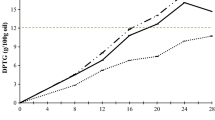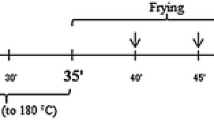Abstract
During cooking oils and fats are exposed to high temperatures that may affect the nutritional quality of foods that are prepared in this way. Concerns have been raised about the degradation of polyunsaturated fatty acids and the formation of potentially harmful compounds during deep frying, but relatively little is known about these changes in other cooking processes. In the present study sponge cakes and fried potatoes were prepared via standardised baking and shallow frying procedures by using different oils and fats (sunflower oil, rapeseed oil, various margarines or butter). The effect of cooking on the retention of two essential fatty acids (linoleic acid and α-linolenic acid) and the formation of trans fatty acids (TFA) and polymerised triacylglycerols (PTG) was evaluated by analyzing fat extracted from the cooked food. It was found that over 95 % of essential fatty acids were retained upon completion of both cooking techniques. The formation of TFA was not significant. Polymerisation was noticeable only in shallow frying, although the final levels of PTG were negligible (<1.3 %). Overall, in contrast to deep frying, oil-based media high in polyunsaturated fatty acids seem to be a good alternative for domestic cooking techniques as they increase the nutritional value of the prepared food.

Similar content being viewed by others
References
World Health Organisation (2013) Preventing chronic diseases; A vital investment. http://whqlibdoc.who.int/publications/2005/9241563001_eng.pdf. Accessed Mar 2013
Mensink RP, Zock PL, Kester ADM, Katan MB (2003) Effects of dietary fatty acids and carbohydrates on the ratio of serum total to HDL cholesterol and on serum lipids and apolipoproteins: a meta-analysis of 60 controlled trials. Am J Clin Nutr 77:1146–1155
Jakobsen MU, O’Reilly EJ, Heitmann BL, Pereira MA, Bälter K, Fraser GE, Goldbourt U, Hallmans G, Knekt P, Liu S, Pietinen P, Spiegelman D, Stevens J, Virtamo J, Willett WC, Ascherio A (2009) Major types of dietary fat and risk of coronary heart disease: a pooled analysis of 11 cohort studies. Am J Clin Nutr 89:1425–1432
Mozaffarian D, Micha R, Wallace S (2010) Effects on coronary heart disease of increasing polyunsaturated fat in place of saturated fat: a systematic review and meta-analysis of randomized controlled trials. PLoS Med 7(3):e1000252 http://www.plosmedicine.org/article/info%3Adoi%2F10.1371%2Fjournal.pmed.1000252
FAO/WHO (2013) Fats and fatty acids in human nutrition. Report of an expert consultation. FAO Food and Nutrition paper 91 Rome 2010 http://www.fao.org/docrep/013/i1953e/i1953e00.pdf. Accessed Mar 2013
Elmadfa I, Kornsteiner M (2009) Dietary fat intake—a global perspective. Ann Nutr Metab 54(Suppl 1):8–14
Choe E, Min DB (2007) Chemistry of deep-fat frying oils. J Food Sci 72:R77–R86
Marquez-Ruiz G, Ruiz-Mendez MV, Ruiz-Mendez MV, Velasco J, Dobarganes C (2010) Preventing oxidation during frying of foods. In: Decker E, Elias R, McClements DJ (eds) Oxidation in foods and beverages and antioxidant applications: Management in different industry sectors, 2nd edn., Series in food science, technology and nutrition No 200. Woodhead Publishing, Sawston, pp 239–273
Zhang Q, Saleh ASM, Chen J, Shen Q (2012) Chemical alterations taken place during deep-fat frying based on certain reaction products: a review. Chem Phys Lipids 165:662–681
Firestone D (2009) Official methods and recommended practices of the AOCS, 6th edn. AOCS Store, Urbana, p 1200
Animal and vegetable fats and oils—determination of polymerized triacylglycerols by high-performance size-exclusion chromatography (HPSEC) ISO 16931: 2009 (2009). Available: http://www.iso.org/iso/catalogue_detail.htm?csnumber=44881
Gertz C (2000) Chemical and physical parameters as quality indicators of used frying fats. Eur J Lipid Sci Technol 102:566–572
Firestone D (1993) Worldwide regulation of frying fats and oils. Inform 4:1366–1371
Dobarganes MC, Pérez-Camino MC, Márquez-Ruíz G (1988) High performance size exclusion chromatography of polar compounds in heated and non-heated fats. Fat Sci Technol 90:308–311
Arroyo R, Cuesta C, Garrido-Polonio C, López-Varela S, Sánchez-Muniz FJ (1992) High-performance size-exclusion chromatographic studies on polar components formed in sunflower oil used for frying. J Am Oil Chem Soc 69:557–563
Cuesta C, Sánchez-Muniz FJ, Garrido-Polonio C, López-Varela S, Arroyo R (1993) Thermoxidative and hydrolytic changes in sunflower oil used in fryings with a fast turnover of fresh oil. J Am Oil Chem Soc 70:1069–1073
Arroyo R, Cuesta C, Sánchez-Montero JM, Sánchez-Muniz FJ (1995) High performance size exclusion chromatography of palm olein used for frying. Fat Sci Technol 97:292–296
Takeoka GR, Full GH, Dao LT (1997) Effect of heating on the characteristics and chemical composition of selected frying oils and fats. J Agric Food Chem 45:3244–3249
Abidi SL, Rennick KA (2003) Determination of nonvolatile components in polar fractions of rice bran oils. J Am Oil Chem Soc 80:1057–1062
Kalogianni EP, Karastogiannidou C, Karapantsios TD (2009) Effect of the presence and absence of potatoes under repeated frying conditions on the composition of palm oil. J Am Oil Chem Soc 86:561–571
Tompkins C, Perkins EG (2000) Frying performance of low-linolenic acid soybean oil. J Am Oil Chem Soc 77:223–229
Bastida S, Sanchez-Muniz FJ (2001) Thermal oxidation of olive oil, sunflower oil and a mix of both oils during forty discontinuous domestic fryings of different foods. Food Sci Technol Int 7:15–21
Warner K (2002) Chemistry of frying oils. In: Akoh C, Min D (eds) Food lipids: chemistry, nutrition and biotechnology. Marcel Dekker, New York, pp 205–221
Velasco J, Marmesat S, Bordeaux O, Márquez-Ruiz G, Dobarganes C (2004) Formation and evolution of monoepoxy fatty acids in thermoxidized olive and sunflower oils and quantitation in used frying oils from restaurants and fried-food outlets. J Agric Food Chem 52:4438–4443
Tsuzuki W, Matsuoka A, Ushida K (2010) Formation of trans fatty acids in edible oils during the frying and heating process. Food Chem 123:976–982
Kalogeropoulos N, Salta FN, Chiou A, Andrikopoulos NK (2007) Formation and distribution of oxidized fatty acids during deep- and pan-frying of potatoes. Eur J Lipid Sci Technol 109:1111–1123
Hrncirik K (2010) Stability of fat-soluble vitamins and PUFA in simulated shallow-frying. Lipid Technol 22:107–109
Choo W, Birch E, Dufour J (2007) Physicochemical and stability characteristics of flaxseed oils during pan-heating. J Am Oil Chem Soc 84:735–740
Andrikopoulos NK, Kalogeropoulos N, Falirea A, Barbagianni MN (2002) Performance of virgin olive oil and vegetable shortening during domestic deep-frying and pan-frying of potatoes. Int J Food Sci Tech 37:177–190
Acknowledgments
The authors would like to thank Ms. Andrea Sekulovic (Unilever R&D, Vlaardingen) for performing the cooking experiments and processing the samples.
Author information
Authors and Affiliations
Corresponding author
About this article
Cite this article
Hrncirik, K., Zeelenberg, M. Stability of Essential Fatty Acids and Formation of Nutritionally Undesirable Compounds in Baking and Shallow Frying. J Am Oil Chem Soc 91, 591–598 (2014). https://doi.org/10.1007/s11746-013-2401-2
Received:
Revised:
Accepted:
Published:
Issue Date:
DOI: https://doi.org/10.1007/s11746-013-2401-2




